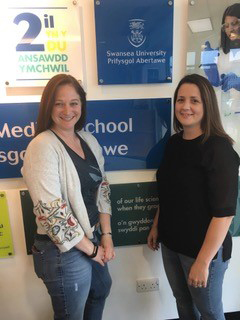Over three and a half million people in the UK are currently living with diabetes, and as that number continues to increase, the role of the diabetes specialist nurse (DSN) is becoming increasingly important. Swansea University Medical School is responding to this training gap with an innovative new distance learning master’s course
The latest Diabetes UK Workforce Survey (2016) highlighted that DSN workload has increased in volume and complexity since the previous 2012 survey. However, almost one-third of DSN posts have been cut or downgraded, or many left unfilled due to recruitment difficulties. The survey also uncovered that 57% of current DSNs will be eligible for retirement within the next 10 years.
Currently, training for DSNs is vocational, however, due to a lack of support to attain the qualifications and the experience necessary to progress and without succession planning, there will be no continuity of training for future DSNs. With the advancements in treatments and technology for diabetes, education for healthcare professionals (HCP) throughout primary and secondary care is required.
Swansea University Medical School has responded to this DSN training gap with the development of a new master’s programme
The unique, modular distance learning programme has been developed jointly by Dr Rebecca Thomas and Dr Sarah Prior at Swansea University Medical School and is led by Professor Stephen Bain. Both have vast experience in diabetes research, postgraduate education.

Dr Rebecca Thomas says: “The challenge of the recruitment, retention and training of diabetes specialist nurses (DSNs) was highlighted at a recent All Party Parliamentary Group (APPG) for Diabetes last year.”
“The DSN role is vital for people with diabetes and DSNs have been facing overwhelming challenges. The workforce is getting smaller while the demand and case complexity is getting bigger.”
The MSc Diabetes Practice has been specifically designed for healthcare professionals – particularly current or future DSNs – wanting to specialise in the field of diabetes. This is a modular distance learning course, offering HCPs the opportunity to graduate with an MSc Diabetes Practice Postgraduate degree studying full or part-time. The curriculum is multi-disciplinary in nature, reflecting the integrated management processes within diabetes. The course not only includes specialised training, diagnostic and assessment-based knowledge but also encompasses personal and professional development, reflective practice and problem-based learning.
Dr Partha Kar, Consultant Diabetologist at Portsmouth NHS trust says: “Diabetes specialist nurses (DSN) are a vital part of the multidisciplinary team – perhaps even the lynchpin of diabetes specialist teams. Part of the £40 million NHS England diabetes transformation funds has been spent on increasing the number of DSNs. However, currently, there is no standard qualification for DSNs, making it difficult for people living with diabetes to know the level of expertise their nurses have.
“In order to improve outcomes, it is important that the diabetes multidisciplinary team ensures their knowledge and skills keep up with the latest advancements in therapies and technology in order to best meet the needs of their patients.”
Dr Sarah Prior, Programme Co-Director, explains: “We have designed the programme to fit around the lives of busy health professionals – as well as being offered as an online distance learning course, we can also offer the option of part-time Master’s, Postgraduate Diplomas and Postgraduate Certificates and individual CPD modules. There are also many funding options including bursaries, postgraduate loans and medical school scholarships.”
Nicola Hewer is a DSN at Cwm Taf University Health Board. She is starting the MSc in Diabetes Practice in September. She says: “As a Community Diabetes Specialist Nurse working for a large Welsh NHS Trust, I face various complex care challenges on a daily basis. My job is very diverse and has both educational and clinical components to it. The number and complexity of people with diabetes is increasing, and I feel that the MSc in Diabetes Practice at Swansea University Medical School will help ensure I am fully equipped to effectively deal with any given situation.
“This course is of particular interest to me as it will allow me to study in my own time to fit in with my busy family and work life. Another plus is that I can choose to do a work-based portfolio, rather than writing another dissertation. I am really looking forward to starting the course in September and am particularly excited about meeting up with other specialists in this field to share best practice during the two residential weeks.”
To find out more about the MSc in Diabetes Practice at Swansea University Medical School email: study@swansea.ac.uk or call +44 (0)1792 602 741.
Visit us: www.swansea.ac.uk/medicine
Residentials CPD accredited
Diabetes Management I 11th-15th February
Pre-insulin treatments – Type 2 diabetes
Insulin initiation – Type 2 diabetes
Continuation of insulin – Type 2 diabetes
Advanced insulin management – changing insulin
Pump therapy – basics
Poster presentations
Evening symposiums with expert speakers:
Tuesday 12th February – speakers Prof Steve Bain and Julie Lewis
Thursday 14th February – speaker Dr Partha Kar
Diabetes Management II 27th-31st January 2020
Advanced pump therapy
Continuous Glucose Monitors
Flash Glucose Monitors
Artificial Pancreas – looping
Use of technology in Pregnancy
Oral presentations
Becky Thomas and Sarah Prior
Programme Directors,
MSc Diabetes Practice
Swansea University Medical School
Tel: +44 (0)1792 295 111
https://twitter.com/SwanseaMedicine
Please note: this is a commercial profile












